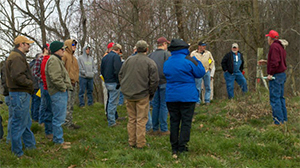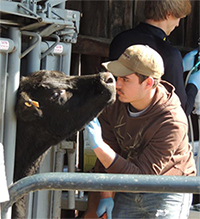Local Programs

Agriculture and natural resources (ANR) programs help sustain the profitability of agricultural and forestry production and enhance and protect the quality of our land and water resources. The Lee County Extension Office delivers programs that help put research-based knowledge to work for the county's agriculture industry. Helping people to solve their problems through educational programs is our business. Extension programs are supported by faculty at Virginia Polytechnic Institute and State University and Virginia State University, and are delivered by local staff and volunteers here in Lee County.
- Beef Quality Assurance Certification and Recertification - Spring of Each Year
- Pasture Walks with Daniel Boone Soil and Water Conservation District - Throughout the Year
- Private Applicator Certification Testing - As Requested
- Private Applicator Recertification Courses - Nov/Dec of Each Year
- Crop Production Workshops - Throughout Year
- Home Gardening Workshops - Throughout Year
*Additional Programs May Take Place Based Upon Need & Timing
Homeowners and farmers can submit insect samples for identification by bringing a live or dead insect sample (well preserved) to the Lee County Extension Office. Extension Agent will try to identify and make a recommendation if insect is a pest. If we are not able to identify, we will mail your insect sample to the Insect ID lab at Virginia Tech.
Homeowners and farmers can submit plant samples for disease identification by bringing a plant sample the Lee County Extension Office. If Extension Agent is not available or able to identify disease, it will mail to the Plant Disease Laboratory at Virginia Tech.

Homeowners and farmers can submit weed samples for identification by bringing freshly dug weed with root wrapped in a moist paper towel inside a ziplock bag to the Extension Office. If Extension Agent is not available or able to identify weed, we will mail to the Weed ID Laboratory at Virginia Tech.
Homeowners and farmers can submit soil samples to the Soil Testing Laboratory at Virginia Tech by picking up soil sample boxes at the Lee County Extension Office. We will provide you with the application form and instructions for taking the soil sample and mailing to the lab. A report will be mailed to you from the Soil Testing Lab with recommendations for the plant/crop you plan to grow.
Forage producers and livestock and horse owners may submit hay or silage samples for nutritional analysis or mold counts. We recommend using Cumberland Valley Analytical Services, Inc. in Hagerstown, MD. The Lee County Extension Office has the forms and protocol for submitting samples by mail. The lab charges a reasonable fee for this service.

Livestock owners may submit feed or forage samples to the VA-Maryland Regional College of Veterinary Medicine at Virginia Tech. The Toxicology Laboratory has the capability to conduct analyses for heavy metals, minerals (deficiencies and poisonings), Vitamins A and E, pesticides, rodenticides, mycotoxins, nitrate, and cyanide. The majority of samples submitted to the laboratory deal with forage and feed analyses for mycotoxins, nitrate, and cyanide. Mycotoxins are typically not a problem in hay or haylage. Individuals unsure of the appropriateness of a sample should contact the toxicologist before sending the sample (540) 231-4587. A representative sample of at least one pound is adequate for feed and forage tests. A history, including feed type, type of animals, and clinical signs should be submitted with each sample. Sample bags and forms are available at the Lee County Extension Office.
4-H Specialty Clubs offered in Lee County are as follows
- 4-H Cloverbud Club
- The Lee County Beef Program (a special interest group for 4-H and FFA youth to participate in beef cattle program.
Several Day Camps are offered during the summer months, along with Junior 4-H Camp.
Please contact at the Lee County Extension Office if you are interested in learning more about these programs.
Engaging with Communities
Virginia Cooperative Extension specialists in community viability work with Extension agents, campus-based faculty, organizational partners, communities, and individuals to further opportunity and build capacity in five program areas:
- Leadership & Planning
- Community Enterprise and Resiliency
- Community Food System and Enterprises
- Community Planning
- Emerging Community Issues
Examples of our work include training county elected officials, educating entrepreneurs, facilitating collaborative projects, supporting the growth of community food systems and local economies, enhancing agent skills and community capacity in facilitation and leadership, conducting problem-driven research, and creating publications and tools that address critical community needs.
Do you have a question about Community Viability?
Perhaps one of the Community Viability specialists below can help you. Contact a Community Viability specialist or direct a question to them using our Ask an Expert system.


